
ETI is one of 57 companies, human rights NGOs, industry associations, investors and trade unions calling on the Government of Turkmenistan to take urgent action to end forced labour in its cotton sector.
ETI has signed up to a Cotton Campaign open letter ahead of Turkmenistan’s participation in the International Labour Conference (ILO) 2016 taking place this week.
During the conference, the ILO will discuss forced labour with the Turkmen government.
Earlier this year, the ILO reported “deep concern” over the widespread use of forced labour in Turkmenistan's cotton production. That emphasis was placed in the original documentation by the ILO Committee of Experts on the Application of Conventions and Recommendations, Individual Observation concerning the Abolition of Forced Labour Convention, 1957 (No.105), Turkmenistan.
And as we stated in our first Modern Slavery newsletter, Turkmenistan imposes cotton production quotas on farmers and coerces its citizens, in particular public sector workers, to pick cotton. Failure to comply can result in incarceration, salary cuts or even loss of job.
